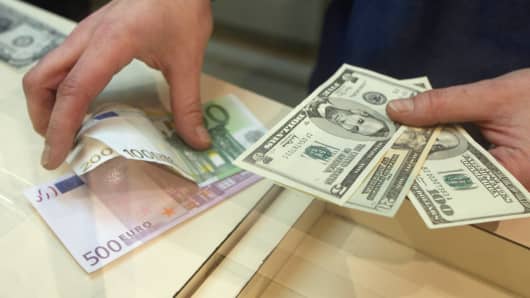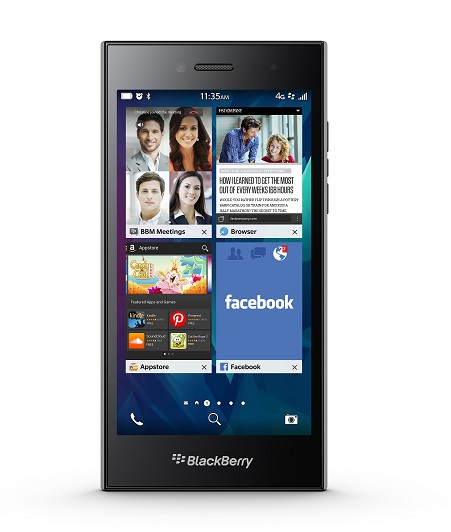As the euro's value sinks, the dollar-euro parity could affect your plans: whether you are investing in foreign markets or just planning a spring vacation in the south of France.
The strong greenback against plunging euro prices means there could soon be a one-to-one exchange rate between the currencies. And the magical state of parity is a significant marker not only because it eliminates the cost of exchanging money—but also because it is a rare occurrence.
The last parity moment was in November 2002. Parity also occurred when the euro was introduced in 1999, and in 2000. So why now? The two currencies getting cozy signifies an ongoing trend in changing money supplies and disparate central bank policies between the United States and the European Union.

Philippe Desmazes | AFP | Getty Images
A clerk handles dollars and euros at a money exchange office in Paris.
What causes currency prices to change?
Because the United States and euro zone have floating exchange rates, the price of money is set by the market, not a government: supply (from the central bank) and demand for the currency.
Demand fluctuates based on factors including the expected inflation or deflation of the currency over time, the perception of a country as a stable place to hold valuable assets, the level of currency reserves needed for purchases, and interest rates.
Why the euro is shrinking
The euro is getting weaker because we know the supply will go up. The European Central Bank has started an aggressive economic stimulus in the form of quantitative easing—in which it is buying bonds off the public-private markets in exchange for cash. Those purchases will flood the market with euros.
In fact, that's the goal. Like the United States did, the European Union hopes to keep money cheap and accessible to its residents to spur economic growth.
But by the law of supply and demand, when there is more to go around, each euro is worth less. A glut of euros is particularly important because currency is seen as a store of value. Like we count on investments to create a return, we count on cash to buy as much as it did yesterday, minus a tiny but predictable amount of inflation each year.
Because the euro is becoming less valuable and has less purchasing power abroad, it's not seen as a valuable way to hold assets, meaning that people may dump euro-denominated assets for an asset with more return.
What is causing the dollar to get stronger?
As a result, the dollar is being seen as a more stable alternative to the euro and has relatively more purchasing power abroad. Compounding the situation, while rates of return in Europe spiral downward, the Federal Reserve is planning to raise interest rates and reduce the money supply—meaning that dollar-denominated assets will become more valuable.
What does this mean for businesses?
American businesses that operate in Europe could feel the strain of dollar-euro parity because it means that it is relatively more expensive to buy their products. It also means that when U.S. companies bring their earnings back across the Atlantic, they dilute their euro-denominated earnings, which are now worth less than they used to be.
Even earlier in 2015, as the dollar strengthened and the euro weakened, multinational corporations like Procter & Gamble and Caterpillarblamed the strong dollar for disappointing earnings.
What does it mean for consumers?
While a rising dollar hurts U.S. businesses selling exports, it helps consumers looking for European imports.
If you're throwing around the idea of buying a villa in Tuscany, now's your chance. When the cost of exchanging money is eliminated, it will make any purchase in Europe relatively cheaper. Prices of goods can't readjust right away to keep up with foreign demand. Those Haribo bears are priced for the locals, which mean you can get a steal.
Read MoreIt's time for that European vacation
How long will it last?
No one knows for sure, but it's likely that the moment of parity—the golden one-to-one ratio—will be brief. The overall currency trend of a beefy dollar and weak euro, however, may be more long term.
With Greece and Germany squabbling over the sluggish economy and a Fed decision to raise rates looming, the forces that are driving a wedge between the demand for euros and dollars may carry on for a while.



 Data centers
Data centers









